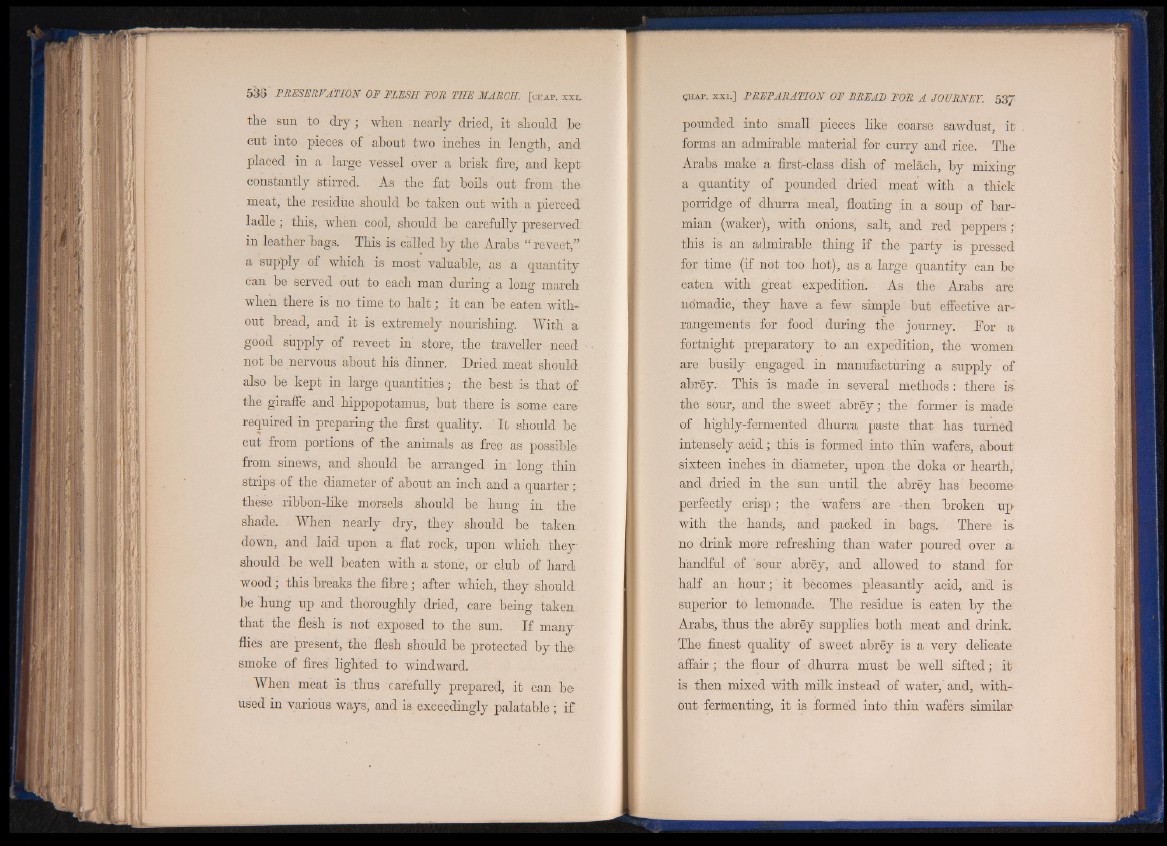
the sun to dry; when, nearly dried, it should he
cut into pieces of about two inches in length, and
placed in a large vessel over a brisk fire, and kept
constantly stirred. As the fat boils out from the
meat, the residue should be taken out with a pierced
ladle; this, when cool, should be carefully preserved
in leather bags. This is called by the Arabs “reveet,”
a supply of which is most valuable, as a quantity
can be served out to each man during a long march
when there is no time to halt; it can be eaten without
bread, and it is extremely nourishing. With a
good supply of reveet in store, the traveller need
not be nervous about his dinner. Dried meat should
also be kept in large quantities; the best is that of
the giraffe and hippopotamus, but there is some care
required in preparing the first quality. It should be
cut from portions of the animals as free as possible
from sinews, and should be arranged in long tliin
strips of the diameter of about an inch and a quarter;
these ribbon-like morsels should be hung in the
shade. When nearly dry, they should be taken
down, and laid upon a flat rock, upon which they-,
should be well beaten with a stone, or club of hard
wood; this breaks the fibre; after which, they should
be hung up and thoroughly dried, care being taken,
that the flesh is not exposed to the sun. If many
flies are present, the flesh should be protected by the.
smoke of fires lighted to windward.
When meat is thus carefully prepared, it can be
used in various ways, and is exceedingly palatable ; if
pounded into small pieces like coarse sawdust, it
forms an admirable material for curry and rice. The
Arabs make a first-class dish of melaeh, by mixing
a quantity of pounded dried meat with a thick
porridge of dhurra meal, floating in a soup of bar-
mian (waker), with onions, salt, and red peppers ;
this is an admirable thing if the party is pressed
for time (if not too hot), as a large quantity can be
eaten with great expedition. As the Arabs are
nomadic, they have a few simple but effective arrangements
for food during the journey. For a
fortnight preparatory to an expedition, the women
are busily engaged in manufacturing a supply of
abréy. This is made in several methods: there is
the sour, and the sweet abréy; the former is made
of highly-fermented dhurra paste that has turned
intensely acid; this is formed into thin wafers, about
sixteen inches in diameter, upon the doka or hearth,
and dried in the sun until the abréy has become
perfectly crisp; the wafers are -then "broken up
with the hands, and packed in bags. There is
no drink more refreshing than water poured over a
handful of sour abréy, and allowed to stand for
half an hour; it becomes pleasantly acid, and is
superior to lemonade. The residue is eaten by the
Arabs, thus the abréy supplies both meat and drink.
The finest quality of sweet abréy is a very delicate
affair; the flour of dhurra must be well sifted; it
is then mixed with milk instead of water, and, without
fermenting, it is formed into thin wafers similar